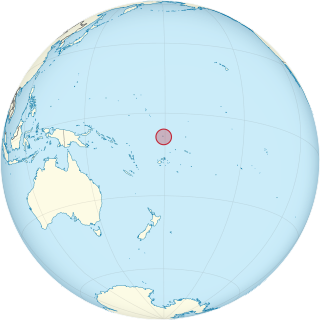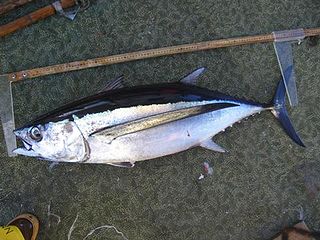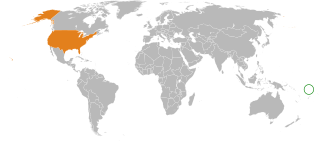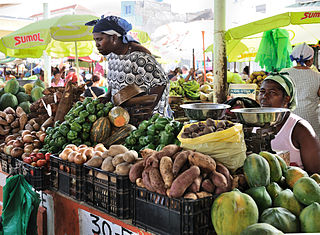Related Research Articles

The Marshall Islands, officially the Republic of the Marshall Islands, is an independent island country near the Equator in the Pacific Ocean, slightly west of the International Date Line. Geographically, the country is part of the larger island group of Micronesia. The country's population of 58,413 people is spread out over five islands and 29 coral atolls, comprising 1,156 individual islands and islets. The capital and largest city is Majuro. It has the largest portion of its territory composed of water of any sovereign state, at 97.87%.

Tuvalu is an island country in the Polynesian subregion of Oceania in the Pacific Ocean. Its islands are situated about midway between Hawaii and Australia. They lie east-northeast of the Santa Cruz Islands, northeast of Vanuatu, southeast of Nauru, south of Kiribati, west of Tokelau, northwest of Samoa and Wallis and Futuna, and north of Fiji. Tuvalu is composed of three reef islands and six atolls. They are spread out between the latitude of 5° and 10° south and between the longitude of 176° and 180°. They lie west of the International Date Line. Tuvalu has a population of 10,507. The total land area of the islands of Tuvalu is 26 square kilometres (10 sq mi).

Tuvalu is a Polynesian island nation located in the Pacific Ocean, midway between Hawaii and Australia, with a population of 11,192 per the 2017 census. The economy of Tuvalu is constrained by its remoteness and lack of economies of scale. Government revenues largely come from fishing licences ; direct grants from international donors ; and income from the Tuvalu Trust Fund. The lease of its highly fortuitous .tv Top Level Domain (TLD) also contributes revenue. The sale of stamps since the independence of Tuvalu in 1976 has been an important source of revenue for the country and government. However, such revenue has significantly declined in recent years. Tuvalu has hardly any tourism. It has no tour guides, tour operators or organised activities and no cruise ships visit.

The albacore, known also as the longfin tuna, is a species of tuna of the order Perciformes. It is found in temperate and tropical waters across the globe in the epipelagic and mesopelagic zones. There are six distinct stocks known globally in the Atlantic, Pacific, and Indian oceans, as well as the Mediterranean Sea. The albacore has an elongate, fusiform body with a conical snout, large eyes, and remarkably long pectoral fins. Its body is a deep blue dorsally and shades of silvery white ventrally. Individuals can reach up to 1.4 m in length.
This article is about the foreign relations of Tuvalu. From 1916 to 1975, Tuvalu was part of the Gilbert and Ellice Islands colony of the United Kingdom. A referendum was held in 1974 to determine whether the Gilbert Islands and Ellice Islands should each have their own administration. As a consequence of the referendum, the separate British colonies of Kiribati and Tuvalu were formed. Tuvalu became fully independent as a sovereign state within the Commonwealth on 1 October 1978. On 5 September 2000, Tuvalu became the 189th member of the United Nations.

The Convention respecting fisheries, boundary and the restoration of slaves, also known as the London Convention, Anglo-American Convention of 1818, Convention of 1818, or simply the Treaty of 1818, is an international treaty signed in 1818 between the United States and the United Kingdom. This treaty resolved standing boundary issues between the two nations. The treaty allowed for joint occupation and settlement of the Oregon Country, known to the British and in Canadian history as the Columbia District of the Hudson's Bay Company, and including the southern portion of its sister district New Caledonia.
Marital rape or spousal rape is the act of sexual intercourse with one's spouse without the spouse's consent. The lack of consent is the essential element and need not involve physical violence. Marital rape is considered a form of domestic violence and sexual abuse. Although, historically, sexual intercourse within marriage was regarded as a right of spouses, engaging in the act without the spouse's consent is now widely classified as rape by many societies around the world, repudiated by international conventions, and increasingly criminalized.

The National Marine Fisheries Service (NMFS), informally known as NOAA Fisheries, is the United States federal agency responsible for the stewardship of national marine resources. The agency conserves and manages fisheries to promote sustainability and prevent lost economic potential associated with overfishing, declining species, and degraded habitats.

Bransfield Strait or Fleet Sea is a body of water about 100 kilometres (60 mi) wide extending for 300 miles (500 km) in a general northeast – southwest direction between the South Shetland Islands and the Antarctic Peninsula.
The Bering Sea Arbitration of 1893 arose out of a fishery dispute between the United Kingdom of Great Britain and Ireland and the United States in the 1880s. The United States Revenue Cutter Service, today known as the United States Coast Guard, captured several Canadian sealer vessels throughout the conflict. Diplomatic representations followed the capture of the first three ships and an order for release was issued by the British imperial government, but it did nothing to stop the seizures and none were released. This led to the U.S. claiming exclusive jurisdiction over the sealing industry in the Bering Sea, and that led to negotiations outside of the courts. The award was given in favor of the British, however, and the Americans were denied exclusive jurisdiction. The British were awarded compensation for the damage that had been inflicted on their vessels, and the American sealing zone remained as it was prior to the conflict.

Illegal, unreported and unregulated fishing (IUU) is an issue around the world. Fishing industry observers believe IUU occurs in most fisheries, and accounts for up to 30% of total catches in some important fisheries.

The status of religious freedom around the world varies from country to country. States can differ based on whether or not they guarantee equal treatment under law for followers of different religions, whether they establish a state religion, the extent to which religious organizations operating within the country are policed, and the extent to which religious law is used as a basis for the country's legal code.

Papua New Guinea – United States relations are bilateral relations between Papua New Guinea and the United States.

Solomon Islands – United States relations are bilateral relations between Solomon Islands and the United States.

Tuvalu – United States relations are bilateral relations between Tuvalu and the United States.

The economy of Cape Verde is a service-oriented economy that is focused on commerce, trade, transport and public services. Cape Verde is a small archipelagic nation that lacks resources and has experienced severe droughts. Agriculture is made difficult by lack of rain and is restricted to only four islands for most of the year. Cape Verde's economy has been steadily growing since the late 1990s, and it is now officially considered a country of average development, being only the second African country to have achieved such transition, after Botswana in 1994. Cape Verde has significant cooperation with Portugal at every level of the economy, which has led it to link its currency first to the Portuguese escudo and, in 1999, to the euro.

The Western and Central Pacific Fisheries Commission (WCPFC) is a treaty-based organisation established to conserve and manage tuna and other highly migratory fish stocks across the western and central areas of the Pacific Ocean. Its full name is Commission for the Conservation and Management of Highly Migratory Fish Stocks in the Western and Central Pacific Ocean. It commenced operations in late 2005, and its secretariat is based in Pohnpei, in the northern Pacific state of the Federated States of Micronesia.
The Nauru Agreement Concerning Cooperation in the Management of Fisheries of Common Interest, or The Nauru Agreement is an Oceania subregional agreement between the Federated States of Micronesia, Kiribati, the Marshall Islands, Nauru, Palau, Papua New Guinea, Solomon Islands and Tuvalu. The eight signatories collectively control 25–30% of the world's tuna supply and approximately 60% of the western and central Pacific tuna supply.

The Pacific Islands Forum Fisheries Agency (FFA) is an intergovernmental agency established in 1979 to facilitate regional co-operation and co-ordination on fisheries policies between its member states in order to achieve conservation and optimum utilisation of living marine resources, in particular highly migratory fish stocks, for the benefit of the peoples of the region, in particular the developing countries. The office campus is located in Honiara, Solomon Islands

Kiribati and Spain have had bilateral diplomatic relations since 2011. The embassy of Spain in Wellington, New Zealand, is accredited for Kiribati.
References
- 1 2 South Pacific Tuna Treaty
 This article incorporates text from this source, which is in the public domain .
This article incorporates text from this source, which is in the public domain . - 1 2 US Department of State, South Pacific Tuna Treaty
 This article incorporates text from this source, which is in the public domain .
This article incorporates text from this source, which is in the public domain .